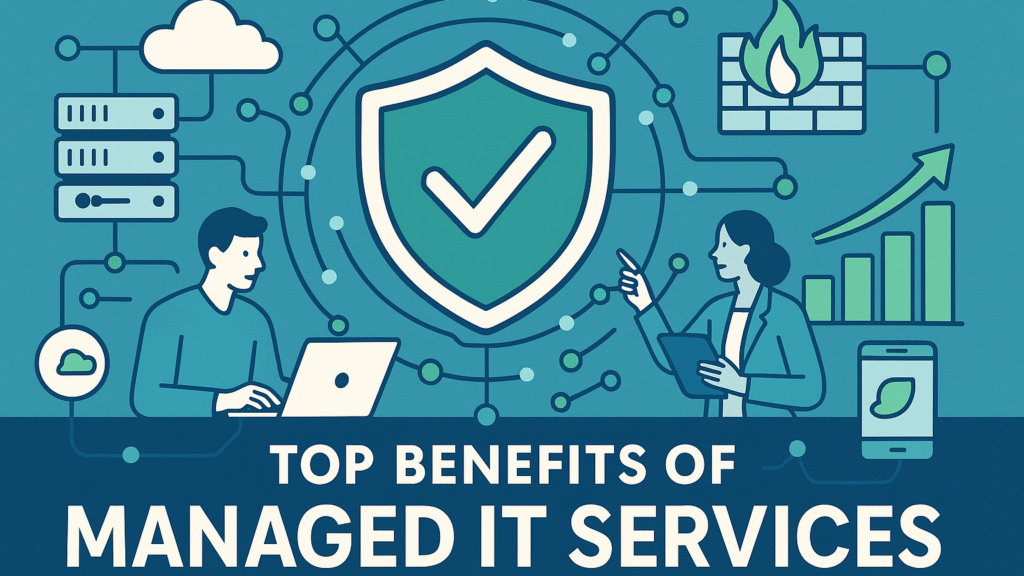
In today’s fast paced digital landscape, businesses are increasingly turning to the benefits of managed IT services to streamline operations, reduce costs, and improve security. The phrase “benefits of managed IT services” is more than just a buzzword: it’s a gateway to understanding how IT outsourcing can transform your business. This article explores the key advantages, supported by industry data and real world examples.
Cost savings and budget efficiency with managed IT Services
Table of Contents
ToggleSavings
- Businesses save 25-50% compared to hiring in house IT staff (Source: CompTIA).
Predictable
- expenses: Fixed monthly fees replace unpredictable capital expenditures.
Reduced
- overhead: No need for office space, salaries, or training for internal teams.
Case Study:A midsized retail company saved $120,000 annually by outsourcing IT management to Executec.com, an MSP featured in SEMrush’s top SERP results.
Enhancing Cybersecurity Through Managed IT Solutions
Managed IT Services provide comprehensive cybersecurity benefits by leveraging AI driven tools for continuous vulnerability detection, ensuring that threats are identified around the clock. These services also offer compliance assistance, helping businesses meet stringent regulations such as GDPR, HIPAA, and PCI-DSS. Additionally, proactive patching and firewall management are integral to risk mitigation, reducing the likelihood of breaches by 70%, as evidenced by IBM’s research.
For instance, a healthcare provider partnering with Synoptek.com experienced zero compliance violations and successfully blocked over 500 phishing attempts each month.
Boosting Efficiency: How Managed IT Services Help
Proactive support is a cornerstone of Managed IT Services, leading to significant improvements in operational efficiency. Service Level Agreements (SLAs) guaranteeing 99.9% uptime ensure seamless business operations, while Managed Service Providers (MSPs) resolve IT issues 50% faster than in-house teams, according to Gartner.
This allows employees to focus more on their core responsibilities and less on troubleshooting IT problems. As a result, companies utilizing MSPs have reported a 20% increase in productivity, as noted by Spiceworks.
Leveraging Expertise and Technology with IT Service Management
Managed IT Services in miami offer access to specialized knowledge and cutting-edge technology. MSPs employ experts in cloud computing, cybersecurity, and network management, providing businesses with top-tier talent without the need for extensive hiring.
Furthermore, these services grant access to enterprise-grade software, such as Security Information and Event Management (SIEM) and Endpoint Detection and Response (EDR) systems, without the upfront costs typically associated with such technologies. This scalability allows businesses to adjust their IT services as they grow, ensuring they always have the right level of support. For example, a startup was able to scale its operations using Hitachi Solutions’ cloud management services, thereby avoiding $200,000 in infrastructure costs.
Ensuring Business Continuity with Managed IT Support
Managed IT Support plays a crucial role in ensuring business continuity, particularly through robust disaster recovery strategies. One of the key components is data backup, where automated and encrypted backups are employed to maintain data integrity and safeguard against data loss. In the event of a ransomware attack, the support provided by a Managed Service Provider (MSP) is invaluable, with statistics showing that 90% of businesses recover within 24 hours when backed by an MSP.
This rapid recovery capability is a testament to the effectiveness of managed IT services in minimizing downtime and potential losses. A notable case study involves a manufacturing firm that, after falling victim to a ransomware attack, was able to restore its operations in just 8 hours with the assistance of Cynet.com. This swift response not only prevented further damage but also saved the company an estimated $500,000 in potential losses, highlighting the significant benefits of having a reliable MSP.

Ensuring Business Continuity with Managed IT Support
Managed IT Support plays a crucial role in ensuring business continuity, particularly through robust disaster recovery strategies. One of the key components is data backup, where automated and encrypted backups are employed to maintain data integrity and safeguard against data loss. In the event of a ransomware attack, the support provided by a Managed Service Provider (MSP) is invaluable, with statistics showing that 90% of businesses recover within 24 hours when backed by an MSP.
This rapid recovery capability is a testament to the effectiveness of managed IT services in miami minimizing downtime and potential losses. A notable case study involves a manufacturing firm that, after falling victim to a ransomware attack, was able to restore its operations in just 8 hours with the assistance of Cynet.com. This swift response not only prevented further damage but also saved the company an estimated $500,000 in potential losses, highlighting the significant benefits of having a reliable MSP.
The Growing Impact of Managed IT Services
The influence of managed IT services on the business landscape is substantial and continues to expand. The global managed services market is on a trajectory to reach a staggering $500 billion by 2030, as projected by Grand View Research. This growth is driven by several factors, with cost savings being a primary motivator; according to Flexera, 60% of businesses outsource their IT services primarily to reduce expenses.
The adoption of managed IT services is particularly prevalent in key industries such as healthcare, retail, and finance, where the need for efficient, secure, and scalable IT solutions is paramount. These industries recognize the strategic advantages that MSPs offer, from enhanced cybersecurity to improved operational efficiency, making managed IT services an integral part of their business strategies.
Selecting the Best Managed Service Provider
When choosing a Managed Service Provider (MSP), it’s essential to assess their expertise by looking for relevant certifications, such as those in Microsoft Azure or Cisco technologies. This ensures that the provider has the necessary skills and knowledge to manage your IT infrastructure effectively. Additionally, it’s important to check reviews and ratings on platforms like G2 and TrustRadius, which can provide insights into the experiences of other businesses with the MSP. Providers like Red River and Auxilion are often highlighted for their quality of service and customer satisfaction.
Another critical factor is to evaluate the Service Level Agreements (SLAs) offered by the MSP. This involves ensuring that the provider guarantees specific response times and uptime percentages, which are crucial for maintaining the reliability and performance of your IT systems. By carefully considering these aspects, you can select an MSP that aligns with your business needs and objectives.

FAQs BENEFITS OF MANAGED IT SERVICES
What are the benefits of managed services?
Managed services provide a wide range of benefits for businesses, making them an attractive option for many organizations. One of the primary advantages is cost savings, as managed services allow companies to reduce both operational and capital expenses by outsourcing their IT management to a specialized provider.
Why do you need managed IT services?
Managed IT services are crucial for businesses that aim to ensure robust security, maintain operational efficiency, and stay compliant with industry regulations. In today’s digital landscape, cyber threats are a constant concern, and managed IT services provide the necessary protection against these threats through advanced security measures.
What is a managed IT service?
A managed IT service is a comprehensive solution where a company outsources the management, monitoring, and problem-solving of its IT systems to a third-party provider, known as a Managed Service Provider (MSP). This service encompasses 24/7 monitoring of the IT infrastructure to ensure continuous oversight and immediate response to any issues.
What is the value of managed services?
The value of managed services is significant, as they offer a comprehensive solution to IT management that delivers numerous advantages. One of the key benefits is cost efficiency, as managed services allow businesses to reduce overall IT costs by leveraging the provider’s resources and expertise.